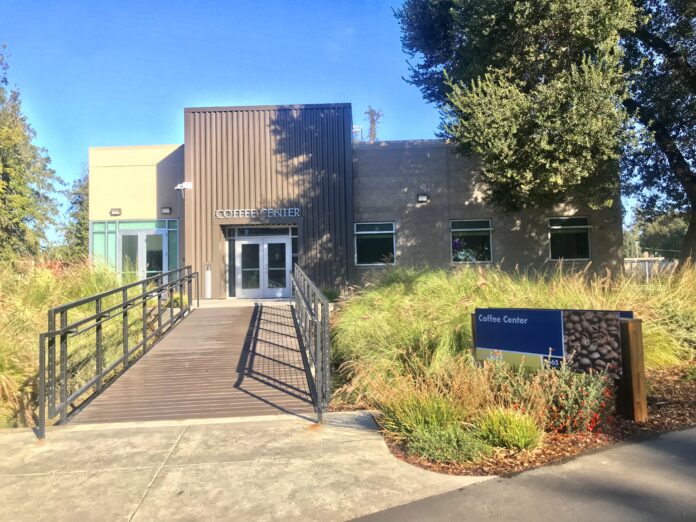Both undergraduate and graduate programs in coffee engineering and research spark interest among students
By RACHEL GAUER — features@theaggie.org
UC Davis’ Coffee Lab, whose large windows offer a view of the intriguing setup inside, catches the eye of any passerby of Everson Hall crossing Hutchison Drive. If the large blue sign reading “Coffee Lab” isn’t enticing enough, inside desks are lined with various coffee makers, contrasting with the typical features of any other STEM laboratory.
The space is the home of ECH 001: Design of Coffee, an introductory course offered in the Chemical Engineering department. The course itself offers an approach to chemical engineering that is more hands-on as opposed to “mathematical,” according to the course description.
Toulik Maitra, a Ph.D. candidate in the Chemical Engineering department, currently serves as a teaching assistant for ECH 001. Though coffee research is not his speciality, he commented on the benefits of being involved in the research behind it.
“We always drink coffee, but we never know how much engineering and science is behind that coffee,” Maitra said. “It’s a fun course in the sense that students are making a lot of coffee and drinking a lot of coffee, but it also gives an overall view of what chemical engineering actually looks like.”
Zoe Tong, a transfer student and managerial economics major, is currently enrolled in ECH 001 and reflected on her experience thus far in the course.
“It’s really hands-on and you get to learn about all of the different flavors and how different elements can change them,” Tong said. “There’s a lot to learn, and it’s good for anyone who needs a good chemistry course.”
Like many other undergraduate students enrolled in the course, Tong selected ECH 001 simply to fulfill unit requirements. In addition to ECH 001, PLS 007: Just Coffee: The Biology, Ecology & Socioeconomic Impacts of the World’s Favorite Drink, a course found in the Plant Sciences department, attracts coffee lovers who perhaps prefer an online course format that can satisfy a broad category of general education requirements.
While these two undergraduate courses flourish in popularity amongst undergraduate students, they represent just the tip of the iceberg of UC Davis’ involvement with coffee research. Nestled in the Arboretum, away from the busy atmosphere of the central campus lies the Coffee Center: a building dedicated solely to coffee research on campus. The center celebrated its opening in early May of this year and is the only one of its kind on a university campus in the United States. Rooms within the facility vary from a traditional classroom and office settings to a brewing room lined with several coffee machines to an experimental room with booths set up for double-blinded tasting.
Timothy Styczynski, who serves as the manager of the Coffee Center, briefly explained just one of the many procedures of coffee research that occurs within the building.
“We can brew different coffees, give them a generic three digit label and then pass them through the [window] so that the people in the next room don’t have a clue what’s in the containers,” Styczunski said.
One room consists of coffee brewing equipment, whereas the adjacent room, connected by a small window, serves as a room to taste the product.
Styczynski also noted that the center is entirely philanthropy-based; that is, they’ve relied heavily on donations from larger corporations to fund the building, such as Peet’s Coffee and J.M. Smuker/Folgers, as well as private donors. Styczynski noted, however, that several rooms and operations within the center still are seeking funding in order to fully operate.
“We’ve been real estate rich but funding poor,” Styczynski said. “There’s never been something like this all under one roof in the United States so as the first, it’s challenging to educate the industry that this space even is available.”
Eventually with sufficient funding, the program hopes to create a graduate program centering specifically around coffee research.
Despite the few challenges the department has faced, coffee-based research continues to thrive at Davis. Willian Klippel Huber, a first-year graduate student in the Biological Systems Engineering program, is currently researching how defects in coffee beans affect the quality and taste of the final product. Klippel Huber, who is from Brazil, attributes his interest in coffee research to a lifelong involvement in its production.
“I grew up on a coffee farm,” Kippel Huber said. “I was into my coffee my whole life.”
His interest in pursuing research stemmed not only from his personal involvement in the practice but also the hands-on experience he gained working with coffee growers in Brazil following his undergraduate studies. Throughout his experience, he noted several issues in the process of harvesting and began to explore alternative methods to combat these problems.
“I was always intrigued by how to build solutions for coffee growers and how to make their lives easier and produce better, more sustainable coffee,” Klippel Huber said. “Harvesting is very difficult and the defects with coffee is a really big problem, which made me wonder how I could help [growers] better. UC Davis seemed like a good place to study and research these problems.”
Written by: Rachel Gauer — features@theaggie.org





